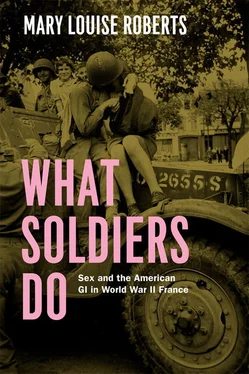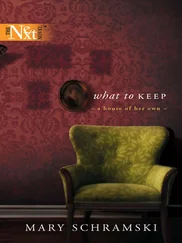Lecadet, Guillaume, 27
Leclerc, General, 64
Lee, John, 233
Lee, Ulysses, 203
Le Havre, France: destruction done to, by bombing campaign, 24, 246; mayor’s complaints about the soldiers, 1–2; mayor’s proposal of a military-regulated sex trade, 181–84, 318n147; military ignoring the public sex problem, 2; popularity of the town for prostitutes, 179–80; problem of dealing with infected women, 191; problem of sexual tensions between French and American men, 109–10; prostitution regulation difficulties, 180–81, 318n122; residents’ complaints about the situation, 181, 318n138; use of GI camps for prostitution, 180, 318n129; violence against the civilian population by the GIs, 74–75; Weed’s response to Voisin’s proposal, 183–84, 319n153
Lelouey, Jules, 216–17
Lemeland, Charles, 26, 32, 38
Lentz-Smith, Adriane, 236, 333n205
Lepage, Jacques, 31, 33
Lepottevin, Marie, 210
Lessafre, Robert, 105
Letellier, Roger, 218
Letourneur, Christian, 40
“Let’s Look at Rape” pamphlet, 224–26, 329n142
Levasseur, Simone, 255
Levoy, Fernand, 119
Levrault, Angèle, 15
Libération soir , 138
Life magazine, 2, 28, 60, 68, 70–71f, 75, 132, 300n145
Lilly, Robert, 220, 321n1
Logrippo, Gerald A., 173
Loisel, René, 128
Look magazine, 60
looting by GIs, 73, 280n44
Lovett, R. B., 186
Lovry, Zozet, 211–12
Lyddon, Donald, 98
Lyon, Allan, 51
Maginnis, John J., 95, 120, 127, 143
Maginot Line, 94
maisons closes , 135–36
maisons de massage , 151
maisons de tolérance , 135–36
Malaparte, Curzio, 293n171
Malraux, André, 284n5
marché noir, le . See black market
Maresquier, Augustin, 24
Marie, Alfred, 49
Marie-Claire , 130
Marthe Richard Law, 138
Martin, Germaine, 35
Mauldin, Bill, 2, 3f, 46, 81, 82f, 93, 170, 286n42, 315n70
May Act, 163
McCloy, John J., 263n7
McConahey, Bill, 122, 126, 135
McDaniel, Edward H., 173, 176
Meissner, William, 126
Mesnil, Yvette, 337n62
Messore, Joseph, 44, 45
Michel, André, 103, 106
military court system for rape trials: black leaders exposing racially motivated convictions, 230–33, 331n177, 331n183; black soldiers’ vulnerability in the court system, 208, 326n76; French critiques of, 252–53; military’s construction of rape as a fact of racial depravity, 227–29; mind-set contributing to black convictions, 223; process used, 206–8, 325–26nn66–69; prosecutors’ assumptions of guilt and failure to verify credibility, 215–18, 222–23, 238n113; punishments for rape, 223–27; standard of proof for rape in a military court, 213–14; time between formal charges and trial, 207, 326n69
Military Justice for the Field Soldier (Wiener), 326n68
military’s view of prostitution: army efforts to reduce exposure to VD, 166–69, 314n50, 314n56; army leaders’ support for military brothels, 159–60, 310nn6–7; army officers blaming French women for infecting US soldiers, 160, 163–64, 176–79, 311n10; army officers ignoring the “off-limits” order regarding prostitution, 172–73, 315n82; army officers’ motivation to conceal VD cases, 172; army’s failure to trace sexual contacts, 169; army’s fear of homosexuality, 174–75, 316n97; army’s fear of scandal over the management of prostitution, 186–87, 319n161; asymmetries in attitudes toward France versus other countries, 189–90; basis of the soaring rates of VD infection, 167; belief that prostitution could prevent rape, 174, 316n90; brothels in Honolulu, 184–85, 319n156; concern over venereal disease’s impact on war readiness, 162–63; conflicting messages sent by the War Department to personnel, 171, 175–76, 315n74, 315n76; Corral establishment, 159, 310nn1–5; differences between the French and Hawaiian situations, 185–86; failings of French medical care for prostitutes, 177–78; French anti-Americanism and, 192, 230n186; French civilians’ outcries against public prostitution, 187–88; Gerhardt’s rationale for and defense of the Corral brothel, 173–75, 316nn92–93; ignoring of the male role in transmission of disease, 178; in Le Havre ( see Le Havre, France); parallels between sexual relations and the struggle over people and territory, 192; policy of secrecy regarding indiscrete overseas activities, 187; postliberation initial designation of segregated brothels, 169, 315n66; postwithdrawal continuation of prostitution, 189; problem of dealing with infected women, 191; racist basis of attitude toward African American soldiers, 164–65, 312nn30–31; soldiers’ complaints about condoms and pro stations, 168–69; successful avoidance of MPs by the GIs, 169–71, 315n70; symbolic connection between VD and Allied anxieties, 165–66; symbolism of prostitution regarding American virility, 164; US military’s insistence on a right to manage sexual commerce, 160–62, 311nn11–12
Miller, Arthur, 128
Monod, Claude, 101
Moorehead, Alan, 36, 116
Morin, Monsieur, 40, 41, 48
Morot, 159
Morris, Gilles, 109, 114, 125, 253
Morris-Dumoulin, Gilles, 293n170
Morrison, Alan, 203, 208
Morse, Ralph, 68, 69f, 258
MPs, 155–56
Munholland, Kim, 330n163
Murphy, Robert M., 15
National Association for the Advancement of Colored People (NAACP), 199, 231, 233
Nelson, Keith, 251
New York Amsterdam News , 232, 237
Nicolle, Jacques, 119, 296n52
Nidub, André, 102
Normandy landings. See Battle of Normandy
Office of Censorship, 230
Office of War Information (OWI), 228
Ok, Joe (Guilloux), 253–54
101st Airborne, 34
112 Gripes about the French , 127, 128, 144
On Photography (Sontag), 278n3
Otts, Lee, 47
Ouest-France , 121
OWI (Office of War Information), 228
Pacary, Arthur and Berthe, 34
Pacific Theater, 322n13
Page, Getty, 124
panpans , 131
Panther Tracks , 115
Parisian prostitutes: acceptance of a new culture of prostitution, 156–57; accounts of GI violence against prostitutes, 146–47, 306nn99–101; attempts to look rich in appearance, 142–43; attempts to maintain the integrity of the brothels, 139; bypassing of legal brothels by GIs, 139–40; communication challenges, 152–53, 308n139; corruption among the police, 154–55; cost of a prostitute, 153–54, 308n153, 308n155; dependence on police and MPs for safety, 148, 307n110; economic factors forcing women into prostitution, 143–44; failings of the French medical care for prostitutes, 177–78; GIs’ collusion with the prostitutes, 155–56; GI’s ease in finding women, 149–51, 307n115; legality of prostitution in France, 135–36; measures taken to protect themselves, 147–48, 307n110; misconduct by, 149; Nazi brothel system, 136–37, 302n29; Paris’s reputation as a place for sex, 133–35, 300n3; pickup process, 151–52; political reasons for the end of legal prostitution, 138; postliberation growth in number of illegal
Parisian prostitutes ( continued ) prostitutes, 137–38; prevalence of venereal disease, 135, 140; profile of, 141–42, 304n62, 305n71; prostitutes aiding the Allies, 137; prostitutes’ willingness to work outside the regulations, 140, 304n58; psychology of the GI craving for sex, 157–58; switch from German to American soldiers, 133–34; system of money and barter, 153; vulnerability of the freelance prostitute, 145–46
parisien libéré, Le , 66, 67
Parrott, James, 210
Patton, George, 160, 172
Peronneau, Madeleine, 214
Perret, Jacques, 17, 31
Читать дальше












